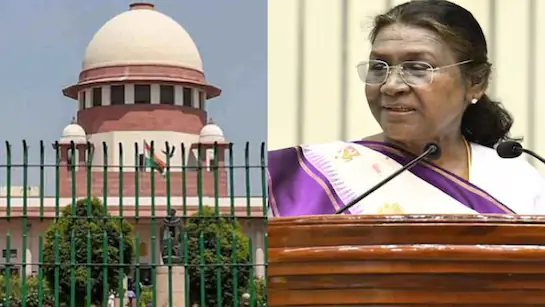New Delhi: In a significant verdict that reinforces constitutional accountability, the Supreme Court of India has ruled that the President must decide on bills referred by a Governor within three months. The court cited a 2016 Office Memorandum issued by the Ministry of Home Affairs (MHA) to support this timeline.
This is the first time the apex court has explicitly set a timeline for decisions under Article 201 of the Constitution, which deals with bills passed by State Legislatures but reserved by Governors for the President’s consideration.
Context: Tamil Nadu Governor’s Delay Deemed ‘Illegal’
The ruling came in a case related to Tamil Nadu Governor R N Ravi, who had reserved 10 bills for the President’s assent in November 2023, despite those bills already being reconsidered and passed by the State Assembly. The Supreme Court called this move “illegal and erroneous”, stating it undermines the democratic process.
No Absolute Veto — Even for the President
A bench of Justices J B Pardiwala and R Mahadevan held that neither the Governor nor the President can exercise unchecked or indefinite power over legislative decisions.
“The President is not an exception to the default rule of timely constitutional functioning,” the court said.
Justice Pardiwala, writing the judgment, said that delays without justification are unconstitutional, especially when they impact the federal balance and disregard the will of elected legislatures.
Inaction Cannot Be a Loophole
While acknowledging that the President is expected to carefully “consider” bills under Article 201, the court emphasized that this cannot be an excuse for inaction. If a decision is delayed beyond three months, the Centre must record and communicate valid reasons to the concerned State.
“Long delays create uncertainty and undermine the popular will expressed through State legislatures,” the bench added.
States Can Challenge Governor’s Discretion
In another key observation, the court said that State Governments have the right to challenge the Governor’s decision if they believe a bill has been reserved against the advice of the Council of Ministers.
This gives States legal recourse in situations where governors act contrary to constitutional conventions, potentially enabling judicial review of discretionary referrals.
Grounded in Recommendations from Key Commissions
The court drew support from the Sarkaria Commission (1983) and the Punchhi Commission (2007), both of which recommended clear timelines for Presidential assent to avoid Centre-State tensions.
It also cited MHA’s 2016 Office Memorandum, which had already set a three-month limit for President’s decision on state bills and three weeks for urgent ordinances.
Key Takeaways:
- The President must decide on Governor-referred bills within 3 months.
- If delayed, reasons must be recorded and shared with the State.
- States can challenge discretionary referrals made by Governors.
- The decision strengthens federal principles and legislative clarity.








